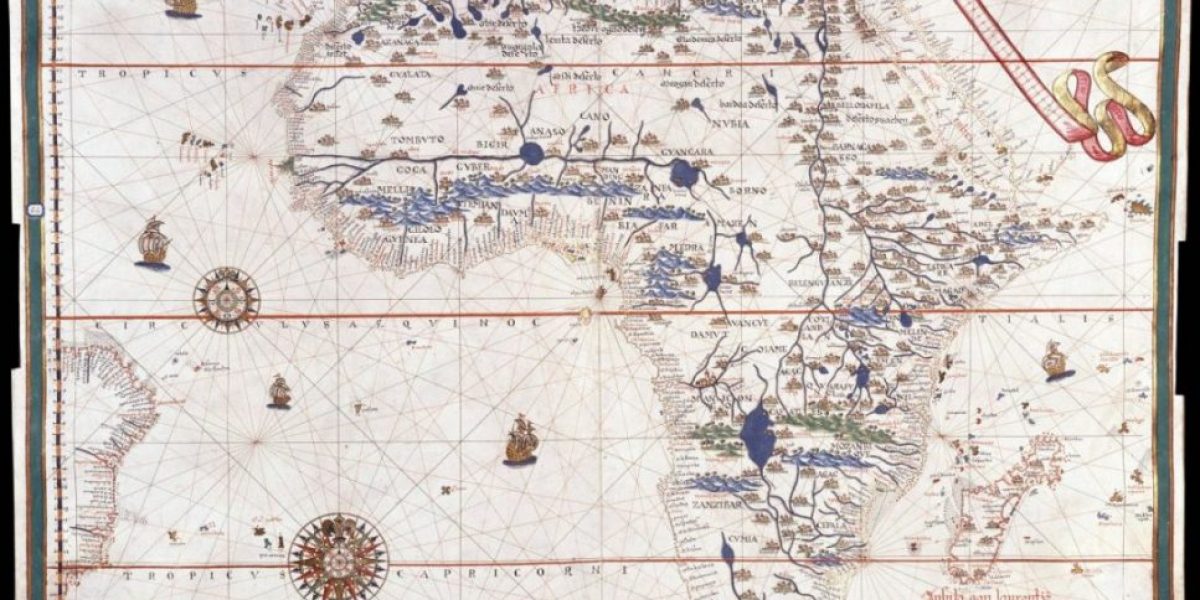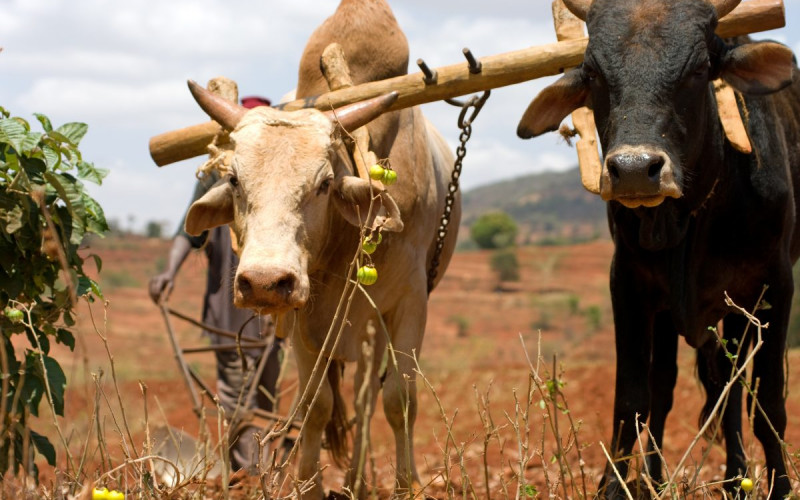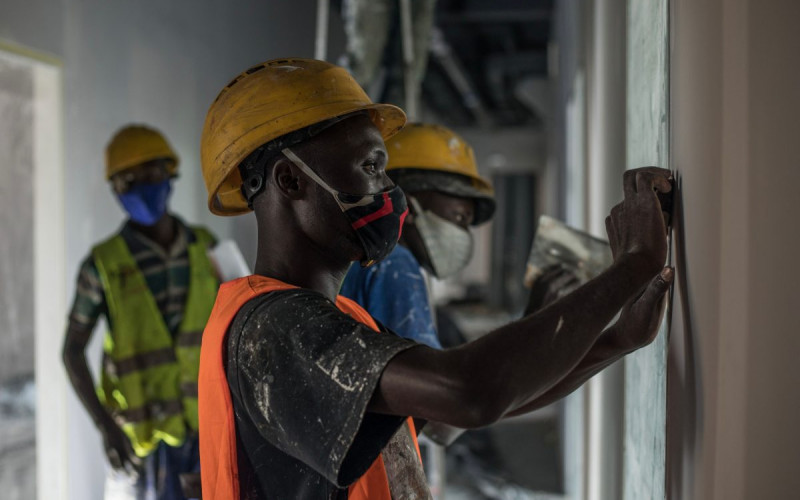Every few years in the global aid industry a new big idea washes ashore, sweeping over the wreckage of a past big idea gone wrong. In the 1960s, when central planning was the rage, money was poured into massive African irrigation and industrialisation projects. These once avant-garde approaches soon unravelled and sustainable development became the next big idea. When sustainability was not enough, experts advocated community participation in planning.
Structural adjustment came into vogue to remedy the chronic deficits, hyper-inflation and crumbling currencies of the 1970s and 80s. In the 1990s structural adjustment’s zeal for macro-economic stability gave birth to the idea that aid should be primarily focused on poverty alleviation.
Two recent reports – by British prime minister Tony Blair’s Commission for Africa (CFA) and by economist Jeffrey Sachs on behalf of the UN Millennium Project – have thrust another grand idea into the mix: Africa is stuck in a ‘poverty trap’ from which it cannot escape without a so-called ‘big push’. Both reports argue that so far aid has been dribbled out in small measures, tantamount to sending a single fire-fighter to an entire block of flats engulfed in flames. To douse the flames, they recommend a package of dramatically larger aid flows, complete debt relief, improved governance, and fundamental changes to the rules of aid and trade.
The Sachs report – Investing in Development: A Practical Plan to Achieve the Millennium Development Goals – includes a 300-page summary and nearly 3,000 pages of supporting reports. The Sachs effort is preparation for a major review of progress toward the UN’s poverty reduction goals, which is set for September 2005. The CFA report, Our Common Interest, is the by-product of a year-long process of public meetings and research, the results of which Blair will use to push for changes in policy toward Africa when the UK assumes the leadership of both the Group of Eight and the European Union later this year.
The Sachs report calls for developed nations to boost aid from 0.25% of the gross national product in 2003 to 0.7% by 2015. The CFA proposes a 100% debt cancellation for the poorest countries, the creation of an international financing facility to front-load development funds to Africa in the next few years, and $75 billion a year in additional development expenditure with one-third to come from African states and the balance in new aid.
The depth of the problem
Although more than $1 trillion in aid and loans have been transferred to Africa in the last 50 years, much of Africa is poorer today than at independence. In 1965, the average African income was more than twice the income of east and south Asians. Today Asian incomes are more than double those in Africa. Between 1990 and 2001, the number of Africans living on less than a dollar a day rose from 227 million to 313 million, according to the World Bank.
Based on present trends, the UNDP estimated in 2003 that it will take Africa until 2147 to meet the Millennium Development Goal of reducing poverty by half. Indeed, the gap between African performance and many of the MDGs is widening. As a result of the lack of progress in Africa, the UN Development Programme decided last year that it would no longer try to estimate when Africa would meet the MDGs.
‘Tropical Africa, even in well governed parts, is stuck in a poverty trap – too poor to achieve robust and high economic growth and in many places too poor to grow at all,’ the Sachs report asserts.
The big push concept argues that governance reform alone will not be enough to break out of this trap because unique circumstances hold Africa back, including high transport costs and small markets; low farm productivity; a particularly high disease burden; lingering effects of colonialism and the Cold War; and a slow uptake of new technology and skills.
Both reports argue that – given Africa’s present low levels of funding, high debt service costs and limited human capacity – the continent will fail to make meaningful progress on health, infrastructure and particularly education. Most of the continent cannot even afford to offer free primary education and the poor quality of instruction is doing nothing to help Africa gain ground on the rest of the fast-developing world.
Trevor Manuel, South Africa’s minister of finance and one of 17 CFA commissioners, argues that if governments fully met public demand for health and education they would have nothing left for any other aspect of government.
The governance conundrum
Advocates of good governance argue that the idea of a big push is not new at all. Donor aid began in the 1950s with the optimistic belief that a concerted effort by developed nations would allow poor countries to leap over intermediate stages of development into industrialised modernity. Why, they ask, if that earlier big push failed, will this one be any more successful?
The first development push failed, in part, because donors turned a blind eye to corruption when recipients were considered necessary Cold War allies. Aid projects and advice were often ill-conceived for African realities or they naively assumed that states possessed the needed managerial and technical expertise. And many recipient countries focused more on exploiting aid flows for personal gain than learning how to maximise their impact.
Some of the past problems of aid have been fixed, but many have not. Blair and Sachs argue that the lack of progress is precisely why the world must redouble its efforts and fix what remains broken. In moral terms, they ask, how can the world stand by and watch a catastrophe unfold? In political terms, how many more civil wars will erupt if African economies are allowed to implode?
For a continent where lack of money is all too common, the demand for more aid has been heartily embraced by political leaders. But the weakness of African governments complicates the issue.
Significant studies note that if Africa does not improve the governance environment into which aid is poured, it will not have the desired effect of improving productivity, creating jobs or building competitive industries. Advocates of good governance assert that massive financial intervention will just exacerbate corruption, much as a sudden influx of money from oil or diamonds have destabilised many countries. Aid also can make it easier for countries to dodge the difficult process of internal reform and make governments less accountable to voters, who won’t be asked to foot the bill because donors have done so.
The third way
The Blair and Sachs reports are significant because they attempt to end the stalemate that has raged for a decade between advocates of good governance and champions of compassion. The CFA and Sachs reports attempt to break the impasse by noting that aid and good governance need not be mutually exclusive but can be done simultaneously. Sachs argues that aid can fix governance problems if it is targeted at improving the systems of government, particularly in six key areas: public administration, the rule of law, transparency and accountability, political and social rights, sound economic policy and supporting civil society.
‘Governance, in short, should be considered in operational terms, subject to investment and improvement,’ the report says.
However, evidence suggests that aid projects to improve governance have fared poorly. Last year, South Africa completed a study of aid directed at improving governance entitled Donor Supported Public Sector Reform in Africa – Dependency, Partnership and Development. It concluded: ‘Hundreds of millions of dollars have already been spent on training individuals and developing institutional systems and procedures, the collective impact of which is obscure and difficult to describe. The World Bank considers that projects and loan activities focussed directly on public sector reforms have performed worse, on average, than other bank activities.’
An internal World Bank review in 2001 concluded that ‘on average 33% of [completed] civil service reform interventions and 38% of ongoing efforts achieved satisfactory outcomes. Even when desirable, outcomes were not sustainable.’
The South African study noted: ‘Donor or lending interventions have tended to deal with the technocratic systems rather than the fundamental problems of the post-colonial state. They have also often insulated government institutions from deep-seated maladies by allowing then to outsource, privatise and de-centralise non-essential activities to the detriment of sectoral reforms and efficient service delivery.’
‘The lack of sustainability or limited impact, reflected in many donor supported governance activities, is often attributed, albeit intuitively, to a lack of organisational grounding and ownership, which results in known bad habits,’ the report concluded.
Reforming aid processes
Both the CFA and Sachs reports take that poor track record on board with a crucial qualifier: massive new aid without reform in aid institutions and African governance won’t work.
‘Without aid practices improving significantly from what they currently are, it would not be advisable to increase aid flows substantially,’ the CFA notes.
The CFA thus touches on a core issue that is discussed but not resolved by the New Partnership for Africa’s Development. Nepad and aid donors are unanimous in calling for improved aid mechanisms and African governance, but are vague on which should come first, the new funding or the improved governance. The CFA argues that aid can be doubled without causing distortions, but a major review of progress and governance would be necessary in three years to determine if further expansion of aid can be digested.
The CFA notes particularly that wealthy countries have an obligation to improve the way aid is administered. ‘Africa must accelerate reform. And the developed world must increase and improve its aid and stop doing those things which hinder Africa’s progress. The developed world has a moral duty – as well as a powerful motive of self-interest – to assist Africa. We believe that now is the time when greater external support can have a major impact and this is a vital moment for the world to get behind Africa’s efforts,’ the CFA report argued.
That aid is poorly administered is not new. The Blair and Sachs reports are just the latest in a very long line of seminal reports and books outlining myriad problems with the complex procedures, self-interested bureaucracies and obtuse goals that make aid dysfunctional.
Sachs lists 10 problems causing dysfunction in the aid delivery system, including policy incoherence, lack of coordination between multilateral donors, lack of focus on MDGs, and a short-term focus on project definition and finance that causes volatile funding levels and detracts from long-term institutional improvement.
For example, many donor countries still ‘tie’ aid so that it must be spent on contractors and suppliers from the giving nation. Recipients thus have to use equipment and consultants from a variety of countries instead of choosing the most cost-effective solutions. The Organisation for Economic Development and Cooperation (OECD) estimated that tying can drive up costs by 15-30% and up to 40% for food aid.
Most donor nations set aid budgets yearly and rarely commit to projects lasting longer than two or three years. Projects to teach improved agricultural methods often spend the first year on setting up administrative systems and field offices. Risk-averse farmers will watch field trials but not partake until solid evidence of success is noted. If logistical or other problems intrude, a three-year project can be in its last year and still have made little headway.
Rhetoric versus reality
Blair and Sachs may wrest some meaningful change from the developed world because both are linked to key summits later this year, which will highlight Africa’s plight and put the case for donors to step up action to ease poverty on the continent.
But some critics are quick to dismiss the big push, pointing out the failure of previous high-minded efforts to help poor countries and the gap between rhetoric and action. Others note that the CFA in particular highlights inconsistencies in Britain’s own policy. In 2003, there were 14 African countries affected by wars and 10 of these had bought arms from Britain, according to the UK-based development agency Action Aid. The EU, under British Trade Commissioner Peter Mandelson, is putting pressure on African governments to open up their domestic markets to free-trade deals that could be devastating for local agro-industries such as tomato paste in Ghana and sugar in Uganda, said Action Aid.
The CFA calls for the international community to ‘open international negotiations on the development of an international arms trade treaty’ and to ‘adopt more effective and legally-binding agreements on territorial and extra-territorial arms brokering’. Yet Britain is the main base for arms brokers and transporters operating in Africa and firms supplying weapons to the governments of Sudan and Zimbabwe as well as Congolese militias who operate with impunity there.
To stem the brain drain in the health sector, the CFA report says: ‘Donors and African governments should urgently invest in training and retention to ensure there are an additional one million health workers by 2015.’ Yet Britain is one of the main Western recruiters of African-trained health workers at great cost to the continent.
On the West’s role in African corruption, the UK government is also on weak ground. The CFA argues that developed countries must rein in corrupt foreign companies operating in Africa. British banks were holding $1.3 billion looted from Nigeria by the late dictator Sani Abacha, but the UK government did not co-operate with Nigerian efforts to recover this stolen wealth. While global press coverage focused on the CFA, another report by the OECD singled out the UK as the only member nation that has not yet complied with the OECD anti-corruption code requiring it to enact laws by which its national companies can be prosecuted for corrupt practices abroad.
Public relations or something new?
Supporters argue that such inconsistencies reflect the report’s candour and are a necessary first step. In a world inured to rhetoric, sincerity is no longer enough.
‘The Africa Commission is just warm words until governments take action,’ said Peter Hardstaff, head of the World Development Movement, a UK-based lobby group that focuses on poverty.
‘Unless we deliver, it’ll be just another report,’ said Myles Wickstead, the Commission’s director, at the launch of the report in March.
But there was praise from some African analysts, who welcomed the Commission’s fresh approach to Africa’s problems, especially its recognition that IMF-style aid conditions and structural adjustment packages had failed.
‘The report marks a creative shift in policy thinking on Africa. 2005 is the time for this bold rhetoric to be matched with real measures that will transform structures that cause poverty in Africa,’ said Thomas Deve of MWENGO, a regional NGO based in Harare.
Moeletsi Mbeki, deputy chairman of the South African Institute of International Affairs, who gave evidence to the Blair Commission last year, backed the report for its emphasis on Africans’ responsibility for reform.
‘I think the Commission’s job was not to find policy solutions but to spark debate. Development policy is about cultural and political issues, this is the job of indigenous leaders. The Commission deserves credit for recognising this.
‘The report touches on or addresses most of the critical issues. My only complaint is that it puts too much emphasis on aid going directly to governments. African governments keep trying to imitate the Washington consensus, yet they lack the capacity to implement even limited policies prescribed by Washington,’ said Mbeki.
Who will do the work?
South Africa, which arguably has the largest, best-financed civil service on the continent, is chronically unable to spend the funds allocated for public works.
‘Future implementation,’ Sachs warns, ‘often cannot proceed without a dramatic expansion of human capacity to deliver services …There is also a severe shortage of managers in most line ministries, especially at the district and community levels.’ Help will be needed from ‘NGOs or the private sector, with real input from civil society.’
He notes that the effort will need far more accountants, managers, teachers, health professionals, economists and agricultural instructors, but he also notes that African primary, secondary and tertiary education needs to be revamped to expand both the quantity and quality of graduates.
If African governments have severe capacity constraints limiting their ability to digest current aid levels, how will they effectively manage a doubling or tripling of aid in a few years? And how long would it take Africa to gear up to absorb the new largesse, if it comes through?
Sachs notes that managing the big push will require a thorough transformation of nearly every area of African governance. ‘The implementation challenge has two main aspects. One is the sheer range of interventions that should be implemented simultaneously to achieve the Goals. The second is the need to reach large parts of the population to have a measurable impact on national outcomes,’ Sachs wrote.
‘His argument is “just increase the money and everything will be fine”. Sachs had to be forced to include corruption as a factor in under-development because he didn’t want to give reasons not to increase aid,’ said one aid specialist in South Africa.
Thus, the big push implies but does not overtly discuss a key problem: It will necessarily bring in a massive cadre of foreign experts, consultants and development officials at a time when Nepad is calling for Africa to learn how to solve and manage its own development.
‘Structural adjustment was devastating because it ignored the human element and just went for growth. Now we’ve realised that growth wasn’t enough, but the Sachs report seems to be still too much a top-down economist’s view,’ said a social scientist at one South African-based aid agency.
‘The major problem with the report is it didn’t say how this new aid will be used. It just wanted to justify increasing aid. But the capacity just isn’t there. There is a real problem finding good people to work on this in Africa, including Africans,’ she said.
Unfashionable as it may sound, Africa will have to bring in more foreign expertise to make up for the shortfall in capacity, said Mbeki. ‘When capacity fails, you have to bring in outsiders. We’re going to have to go back to the situation in the 1960s when Africa needed lots of expatriates, but they should be here to strengthen civil society and non-state bodies not tinker with government.’
‘The report says Africa needs $500 million a year to strengthen universities, but African scientists have gone to Europe or America and they won’t come back. Western scientists, on the other hand, may be willing to come for two years at a time and we have to use them,’ Mbeki said.
Reaction
What matters more is the reaction in the G8 members, who will be called on to make difficult changes to aid systems, fund debt relief and push through changes to trade rules. Already the US government has ruled out the International Financing Facility so aggressively marketed by British Chancellor of the Exchequer Gordon Brown. The US Treasury Undersecretary for International Affairs, John Taylor, said in late March that the US supported in principle the Commission’s report, but could not commit itself to the finance facility, which would borrow money on global capital markets to be repaid from future national aid budgets.
‘The report has some good material on ways to reduce poverty. We support its goals and agree with its emphasis on measurability,’ he told journalists in Nairobi, Kenya.
‘The proposed International Finance Facility works for Britain and other countries, and that is fine. But for us, and others like Canada and Japan, our laws are such that the legislature cannot commit the nation’s funds many years into the future.’
The US and Paul Wolfowitz – the incoming president of the World Bank – believe in linking fresh aid to good governance.
The Blair report also calls for Africa to match aid donors’ funds. Trevor Manuel told journalists in Cape Town: ‘Twenty five billion [dollars] would have to come from Africa – and it’s there that you need to change taxation, you need to tax the elite – this does not happen enough in African countries. You need to prevent the outflow of capital and President Mbeki has spoken about (creating) a fund that would trap African pension funds, some 67% of which is invested in Europe and the US.’
Despite these reservations, Nepad has welcomed the Blair report.
‘We need to get the buy-in from the African governments, then we have to work out how the proposals could be implemented,’ said Mohammed Jahed, chief economist at the Nepad secretariat, in response to the report.
‘But our main concern is that the Blair proposals still have to be sold to the G8.’








